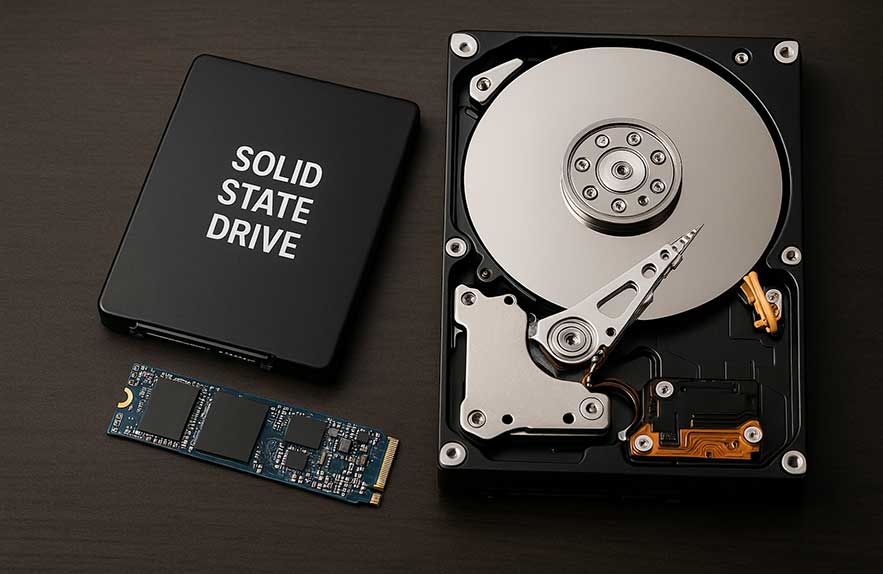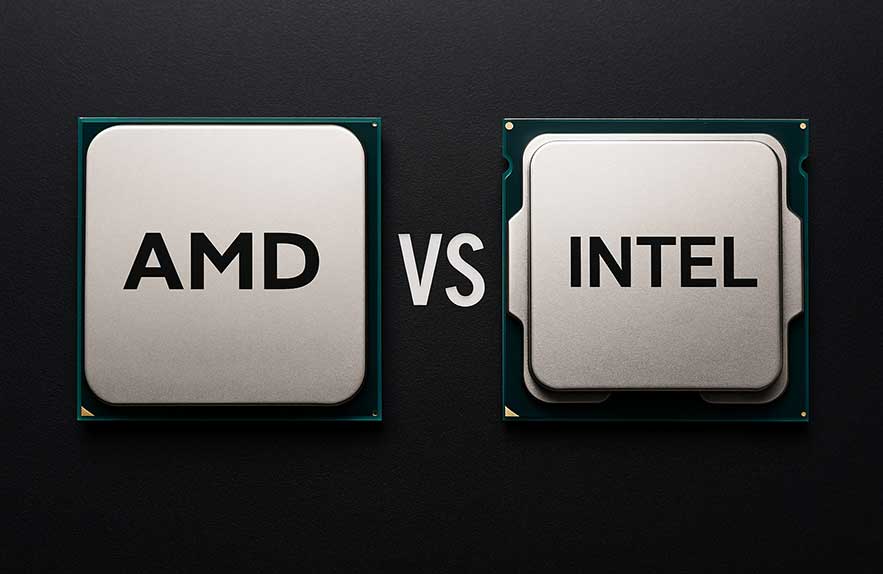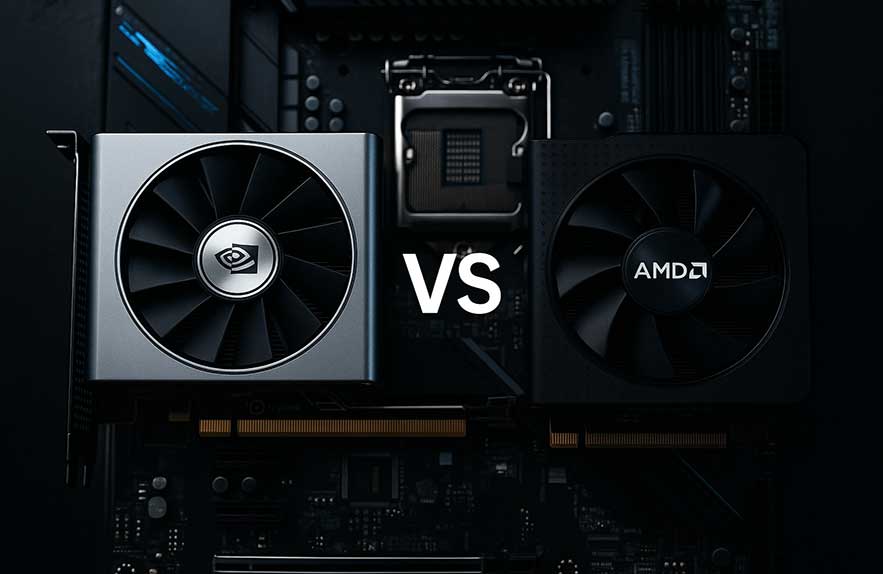
External SSD vs HDD: Why Choosing the Right Storage Matters
External ssd vs hdd is the big storage decision today for anyone moving files, backing up important data, or working with large digital projects. External storage has become a must for everyday people, not just tech experts. Whether you manage school documents, keep a family photo archive, or shuttle business files between the office and home, the question of external ssd vs hdd affects how fast you get work done and how safe your data will be. It is the starting point for shoppers looking for value and reliability in modern storage devices.
The appeal of external storage grows every year as our digital lives expand. A decade ago, most backups and large files lived on bulky external hard drives. These HDDs made a name for themselves by offering huge capacities for a low price, but they often felt heavy and slow. Today, external ssd vs hdd is about weighing portability and speed against capacity and cost. SSDs bring a leap ahead with silent operation and the power to move gigabytes in seconds, while external HDDs remain the go-to for saving entire movie libraries or old project archives on a budget.
Why has external ssd vs hdd become so important for everyone from students to graphic designers? Large cameras and smartphones fill up fast with photos and videos. Modern video games, music collections, and work presentations eat up gigabytes. When you need to move these files quickly, carry them safely, or just protect them from loss in case your PC fails, you turn to external storage. People now expect their backup drive to be both fast and portable, and that means understanding why the right choice between external ssd vs hdd really matters.
The basics are simple: external SSDs are fast, light, and tough enough for travel. They keep up with big file transfers and are ideal if you want to run programs or edit photos directly from your backup drive. External HDDs, however, are unbeatable for pure capacity. If you need massive amounts of space for old games, family videos, or whole-system backups, a reliable external HDD often costs far less per terabyte than similar-sized SSDs. Still, the decision is about more than numbers. Real-world speed, how much you plan to carry the device, and peace of mind matter most for long-term storage health.
Shoppers navigating the external ssd vs hdd debate will find that both types have come a long way. Modern external SSDs can easily withstand shocks from being tossed in a backpack, and their speeds make computer work much more efficient. External hard drives, on the other hand, provide the best value for gathering years of memories or keeping complete system images. For a hands-on review of the transition from external HDDs to SSDs, the Digital Trends SSD vs HDD explainer is a reader favorite.
When it comes to your important files, backups, or creative projects, knowing which storage device to choose is no longer just a technical debate—it is everyday peace of mind. In the next section, we will dig into exactly how these drives compare on speed so you can feel confident in your next upgrade or purchase.
Table of Contents
- External SSD vs HDD: Why Choosing the Right Storage Matters
- Speed and Performance: How External SSDs and HDDs Compare
- Lifespan and Durability: Which Lasts Longer?
- Storage Capacity and Price: What You’re Paying For
- Which Is Right for You?
- Final Thoughts: Why Choosing the Right Storage Device Matters
Speed and Performance: How External SSDs and HDDs Compare
If you are weighing the choice of external hdd vs external ssd, speed is the first and most noticeable difference. External storage is not just about how much data you can haul around—it is also about how quickly you can get your work, photos, or games where you need them. The performance gap between an external ssd vs hdd is bigger than ever, shaping the user experience for students, professionals, and families alike.
External HDDs, or hard disk drives, use spinning magnetic disks to store information. Every time you copy a file, the drive physically moves its read and write heads to access or save your data. This design has not changed much in decades, and it is why external HDDs are so affordable for big storage needs. However, their mechanical nature means speeds are limited. Most will transfer files at 100 to 150 megabytes per second, which can feel slow when you are moving huge video folders, game installs, or photo libraries.
External SSDs, by contrast, use flash memory—no moving parts, no waiting for disks to spin up. This difference matters most in real-world tasks. Plug in an external ssd and you may see speeds of 400, 500, even over 1000 megabytes per second with the latest models. What does this mean in practice? Moving a 10GB video file might take a minute or more on an external HDD, but only a handful of seconds with an external SSD. For anyone who regularly copies large files, backs up projects, or runs applications directly from the drive, the speed advantage is undeniable.
The external hdd vs external ssd debate is about more than benchmarks. Students using the same external device for class projects, travelers moving media on the go, or families archiving photos will appreciate faster times when it matters. Even backing up a computer or restoring an old system is far less stressful when done on an external SSD. File search, app launches, database access, and even basic file browsing all feel smoother, especially as storage grows and folders fill up. People switching from an old external HDD to a modern SSD almost always comment on the time saved, even if their main reason for upgrading is peace of mind.
The only exception comes with pure backup jobs for giant archives. If you need to move hundreds of gigabytes at once and speed is not your main concern, an external HDD still provides good value. For the best of both worlds, some users keep an SSD for daily work and an HDD for deep storage or archives. If you want to see detailed benchmarks and real user experiences, PC Gamer’s SSD vs HDD review highlights the everyday impact of choosing the right external device.
To sum up, when speed matters—like loading games, opening huge files, or staying productive on a busy schedule—an external SSD is the clear winner. If capacity at a low cost remains your primary need, external HDDs still deserve a place in your backup arsenal. Next, we will explore questions around lifespan and durability to see which option gives more reliability for storing your most important files.
Lifespan and Durability: Which Lasts Longer?
When making the decision between external ssd vs hdd, it is absolutely worth considering how long your storage device will last. Lifespan and durability matter when your projects, photos, or work files may stay on one drive for years. The debate between external hdd vs external ssd, especially when you factor in ssd vs hdd lifespan, can sometimes grow confusing because both types offer different strengths for real-world use.
Let’s start with external HDDs. Traditional hard drives, or HDDs, have spinning disks and moving heads inside. This design, found in almost every hard drive for decades, is why many people still trust them for large file storage. However, hard drive ssd vs hdd reliability is often questioned for portable use. Because an HDD is made of delicate mechanical parts, it is more vulnerable to damage if dropped, bumped, or even carried on-the-go frequently. Just taking your external HDD to and from work in a backpack can shorten its lifespan or cause data failure after shock or vibration.
External SSDs take a different approach, storing all your data in solid-state memory chips. This means there are no moving parts inside at all. When people ask about ssd storage vs hard drive storage for backups and travel, this is a big win for SSDs. They hold up far better under physical stress, resist shock, and tolerate temperature swings—making them far less likely to die from a single bad drop. That’s one key reason travelers, students, and content creators are choosing external SSDs for critical files and media that have to survive long commutes or film shoots.
That said, ssd vs hdd lifespan is not so simple that one always outlasts the other. SSDs wear down based on how many times their memory cells get written and rewritten, known as write cycles. In normal use, even with daily file transfers, it takes years to use up these cycles. Most users never hit this limit before upgrading to new storage. In contrast, an external hdd can keep files for many years if it stays put and is handled with care, making it an option for archives and bulk storage that does not see much daily movement.
So, external ssd vs hdd choices for durability come down to your lifestyle. If your external drive will stay mostly at your desk, a hard drive ssd vs hdd debate leans toward HDDs for value on big bulky backups. If the device lives in your backpack or gets used outdoors, ssd storage vs hard drive storage usually goes to SSDs for their physical toughness. But remember, any drive—no matter which you choose—can fail eventually, so backing up your most important files to more than one device is always wise.
If you want to see real-world longevity statistics comparing external ssd vs hdd, check out HDI Forum’s SSD vs HDD lifespan guide with failure rate comparisons and advice for smart backup routines. Next, we will tackle price and capacity to help you see not just which drives last, but which offer the best fit for your storage plans and budget over time.
Storage Capacity and Price: What You’re Paying For
Anyone comparing hard drive ssd vs hdd quickly runs into two of the most important questions: how much space do I get, and how much will it cost? Understanding how storage prices and capacities work is just as important as picking for speed or durability. Every shopper wants the most for their money. When you compare external ssd vs hdd, this often means a trade-off between fast, convenient storage and getting plenty of room for backups and media libraries.
The classic external hdd vs external ssd comparison usually comes down to capacity. External hard drives are still friendliest to small budgets. You can find a four-terabyte (4TB) hard drive for a price that might only get you a one-terabyte (1TB) SSD. If your main goal is to store large amounts of videos, photos, or years of work documents, then the sheer amount of space that a hard drive provides is tough to beat for the money. HDDs are also still common as backup drives, especially if you want to make weekly or monthly copies of everything on your computer without breaking the bank.
External SSDs, though, have become the first choice for users who value speed and portability more than massive space. SSD storage vs hard drive storage means paying more per gigabyte, but you get top performance for file transfers, editing tasks, and running applications directly from your external device. Many creators, gamers, or anyone working with big project files prefer a smaller SSD because it saves time every day. The weight difference is also huge: SSDs can be tiny and light enough to carry in a pocket, while big external HDDs can be a hassle for those who travel often.
Hybrid setups are now common. Power users often keep a large-capacity external HDD for long-term storage, and a smaller SSD for the daily transfer of important files or video projects. This lets you take advantage of the low price of HDDs for archives and benefit from SSD speed for the things you need most often. When looking at ssd storage vs hard drive storage, pay close attention to your own habits: how often you move large files, how much you carry your drive around, and how much room you need for backups or media collections.
Prices for SSDs have been dropping quickly, closing the gap between ssd and hard drive options. Entry-level drives are now a practical choice for many types of users, not just creative professionals or tech enthusiasts. If you want to see how the market is shifting and compare specific cost per terabyte, the Windows Club’s SSD vs HDD guide includes frequent price updates and clear charts for reference.
In the next section, we will help you match your storage choice to your actual needs, from budget shoppers and heavy gamers to travelers and everyday home users, to make sure you get the best possible value and experience from your next upgrade.
Which Is Right for You?
With so many choices out there, deciding on ssd storage vs hard drive storage can feel overwhelming. Picking between external ssd vs hdd is really about matching the storage device to your real needs, habits, and expectations. There is no universal best answer. The right storage solution depends on how you use your computer, how much data you collect, and what you value most when saving or accessing your files.
For gamers, creatives, and anyone dealing with video projects or large game installations, ssd storage vs hard drive storage is an easy call. An external SSD will deliver quick load times, nearly instant file transfers, and smooth edits for multimedia. You can use scheduling or editing software directly from an SSD with no slowdown. If you frequently move big files, stream high-resolution videos, or work with important client data, you will notice the benefits of SSD speed every day.
Budget-focused shoppers and people who mainly need backup or archive space should focus on external hdd vs external ssd choices. For regular photos, music, finished files, or old projects you want to keep safe, a large external hard drive offers unbeatable value per terabyte. Many families and office teams choose HDDs because they are cheaper, last for years on a shelf, and usually provide enough space to back up entire computers or groups of devices in one place. For those building the ultimate home media library or doing system backups for peace of mind, hard drive ssd vs hdd arguments generally land on the tried-and-true hard drive side for sheer storage capacity.
Increasingly, people are turning to hybrid storage solutions as well. If you love the high speeds and portability of an external SSD but need space for years of photos, movies, or backups, you can easily use both. Store your current work, games, or creative projects on a fast, portable SSD and keep your archive on a big external HDD. This balanced approach covers all your needs: instant access and large backup capacity. Hybrid setups also give you flexibility for future upgrades if your demands change later.
Choosing ssd storage vs hard drive storage wisely means thinking about your own habits. Do you carry files between school and home or share projects at work? Are you hoping to edit videos or play the newest games without delays? Or do you primarily want to protect personal photos from hard drive failures or clean up your computer without spending a lot? There is no wrong choice, only the smartest match for your routine. For a hands-on storage selector and feature checklists, Lifewire’s SSD vs HDD buyer’s guide is a great resource with examples for every situation.
As you make your decision about external ssd vs hdd, remember that it is about making storage fit your lifestyle, not the other way around. In the final section, we will bring it all together, so you feel ready to upgrade or purchase your next storage device with total confidence.
Final Thoughts: Why Choosing the Right Storage Device Matters
Choosing between external ssd vs hdd is a decision with real, everyday consequences. Your photos, projects, and work rely on smart storage choices. When you compare external hdd vs external ssd, it comes down to speed, portability, value, and reliability. Some people want the fastest transfers and a rugged drive, while others prioritize low cost per terabyte for massive backups or media libraries. Both storage devices matter, and the right pick is about finding what truly lines up with your needs and habits.
For those who care about performance, ssd storage vs hard drive storage will seem like a game changer. Booting up, moving project folders, and editing big video files are easier with an SSD. But hard drive ssd vs hdd debates will always favor the classic hard drive for people seeking maximum space and affordability. The best setups—even for professionals—often include one of each, letting you balance instant access with peace of mind for long-term backups.
As technology evolves, expect storage options to get faster, lighter, and more durable than ever. Today’s SSDs are already giving average users the kind of performance once reserved for high-end workstations. Meanwhile, bigger external HDDs mean you can save your memories and work projects without constantly cleaning out space. Check for deals, read reviews, and decide whether your real-world life calls for extreme speeds, giant archives, or a mix of both.
If you want to compare the latest storage tech hands-on, or are looking for clear checklists on picking the right external ssd vs hdd, Tech Advisor’s SSD vs HDD guide gives updated advice for every type of buyer. No matter your choice, you are making a smart move protecting your files, making work faster, and ensuring your digital world stays safe from unexpected problems in the years ahead.
So the next time you shop or upgrade, take a little time to go beyond the headline numbers and really think about how you use your computer most. Whether it’s speed, space, or peace of mind, the right storage device turns everyday file chores into one less thing to worry about.

